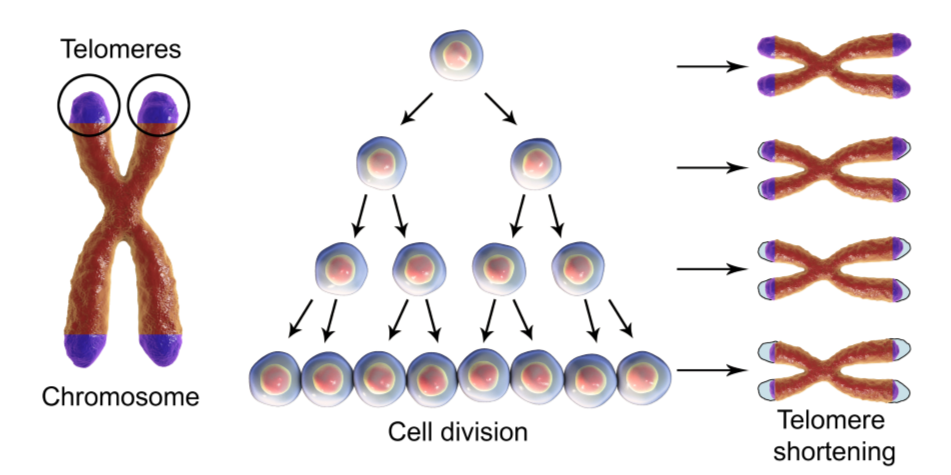Since the beginning of time, mankind has been trying to find ways to stay young while growing old. While aging is inevitable, there are ways to slow the process. Each of us is born with an internal biological clock that regulates our lifespan. Knowing how this clock works, we can better understand how we age and how to slow the process.
To understand the aging process, we need to look inside our cells. Inside each cell, there is a specialized organelle called the nucleus that serves as the information processing and administrative center of the cell. The nucleus stores the cell’s hereditary material (DNA) on our chromosomes. The chromosomes coordinate the cell’s activities, including growth, metabolism, protein synthesis, and cell division (replication).
At both ends, chromosomes are protected by caps or tips called telomeres. From the Greek telos (end) and mercos (end), telomeres are akin to the plastic tips on the ends of shoelaces that prevent them from fraying. Telomeres protect the vital information stored in our DNA and are involved in all aspects of the aging process, as well as disease development and progression. Telomere length represents your true or biological age as opposed to your chronological age. There is a direct link between telomere length and how long and how well you will likely live.
 Cell division is needed to produce new cells for growth and repair of body tissues. This happens repeatedly throughout our lives. Each time a cell replicates itself, the telomeres make sure the DNA stays intact. Cell division is not limitless, however. At birth, we have long telomeres, but as we grow older, with each cell division, our telomeres become shorter and shorter. Eventually, telomeres get too short to allow for further cell replication. When a cell stops dividing, it ultimately dies. And when enough cells die, we die. Longer telomeres correlate to disease resistance, healthy aging, and increased lifespan. Without the protection from telomeres, chronic degenerative disease develops and aging accelerates, leading to suffering and premature death.
Cell division is needed to produce new cells for growth and repair of body tissues. This happens repeatedly throughout our lives. Each time a cell replicates itself, the telomeres make sure the DNA stays intact. Cell division is not limitless, however. At birth, we have long telomeres, but as we grow older, with each cell division, our telomeres become shorter and shorter. Eventually, telomeres get too short to allow for further cell replication. When a cell stops dividing, it ultimately dies. And when enough cells die, we die. Longer telomeres correlate to disease resistance, healthy aging, and increased lifespan. Without the protection from telomeres, chronic degenerative disease develops and aging accelerates, leading to suffering and premature death.
The good news is the telomere length is not static but rather, it is dynamic. This means that it is changeable! One the one hand, by making poor dietary and lifestyle choices, you will accelerate the shortening of your telomeres. On the other hand, by making healthy choices, not only can you slow the rate of telomere shortening, you can even increase the length of your telomeres.
The best way to rapidly shorten your telomeres and your life is to continue eating the standard American diet consisting of processed foods; excess carbohydrates, meat, dairy products, and salt; and minimal intake of fruits, vegetables, and omega-3 fats. Being overweight or obese, avoiding exercise, and getting too little sleep are additional ways to accelerate the shortening of your telomeres and hastening your death. On the hand, here are the things that can slow the rate of telomere shortening and possibly even reverse the shortening:
- Proper diet (click here)
- Intermittent fasting (click here)
- Staying well hydrated (click here)
- Maintaining a healthy weight (click here)
- Strength training exercise (click here)
- Getting sound sleep (click here)
- Stress reduction (click here)
- Improving glycemic control (lowering fasting and post-mealtime glucose and insulin; click here)
- Reducing systemic inflammation (lowering C-reactive protein, homocysteine, and fibrinogen; click here)
- Reducing oxidative stress (lowering 8-hydroxydeoxyguanosine; click here)
- Targeted nutritional supplements (alpha-lipoic acid, gamma tocotrienol, gingko biloba, green tea extract, multivitamin/multimineral with phytonutrients, N-acetyl cysteine, omega-3 fatty acids, resveratrol, selenomethionine, silymarin, vitamin D3, and zinc)
Americans are retiring later, dying sooner, and are sicker in between. It doesn’t need to be this way! A wise man once said, “Take care of your body; it’s the only place you have to live.” If you make the right diet and lifestyle choices and stick with them, you can enjoy a lower risk of chronic and age-related diseases, better overall health, and greater life expectancy. What could better than that?
Comments: For those wanting the ultimate biomarker for aging and disease that can provide an objective and scientific way to project their current life expectancy and future health, we offer a new blood test call Life Length (click here and here). This advanced test represents a new frontier in longevity science. Life Length measures your percentage of critically short telomeres. Having this valuable information can help you better understand your health. It can also be a wake-up call for those who need to improve their diet and lifestyle. The cost of the Life Length test is $795.
